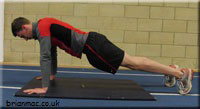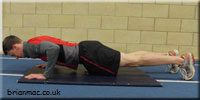

Step Training
Most athletes would like to increase the number of repetitions they can perform for a given exercise, e.g. press-ups or sit-ups. To increase the number of repetitions you can complete, you need to perform the exercise with sufficient volume to allow the body to learn how to improve the neuromuscular pathways when executing the activity. The limiting factor is not your muscles' size but the nervous supply to those muscles.
Traditional training routineA regular press-up session may comprise three sets to failure with 3 minutes of recovery. For example, in this workout, you may manage ten press-ups in the 1st set, 8 in the 2nd and 5 in the 3rd set giving a total workout volume of 23 press-ups. More volume (repetitions) is required to increase the neuromuscular pathways for the press-up. Still, insufficient strength makes this a difficult task, so how do you achieve sufficient volume to improve your number of press-ups? |
  |
Alternative training routine
A possible solution to increase the volume is "Step Training", and the protocol is as follows:
- Perform 1 repetition of the exercise.
- Rest for 10 seconds.
- Perform 2 repetitions of the exercise.
- Rest for 10 seconds.
- Perform 3 repetitions of the exercise.
- Rest for 10 seconds.
- Perform 4 repetitions of the exercise.
- Rest for 10 seconds.
- Keep adding one repetition and resting for 10 seconds until you are unable to continue, i.e. you manage 4 repetitions, rest for 10 seconds, but then you cannot manage 5 repetitions.
- Record the total number of repetitions of the exercise that you have completed. If you only managed 4 repetitions when the target was 5, you have completed 1+2+3+4+4 = 14 repetitions.
- This is the end of your 1st set.
- Rest for 3 minutes and then repeat steps 1 to 10 inclusive.
- This is the end of your 2nd set.
- Rest for 3 minutes and then repeat steps 1 to 10 inclusive.
- It is the end of your 3rd set and the end of the workout.
Increased volume (repetitions)
If you add up the number of repetitions completed in each of the three sets, you will find it is higher than the traditional 3 set method. As you are training for muscular endurance, you require a 48-hour recovery, as this is how long it takes to restore your glycogen stores fully. (Piehl 1974)[1].
Conclusion
It is an excellent protocol for increasing overall training volume that can be applied to all exercises and provides a great way of exposing you to a much higher volume of work. It works well with bodyweight exercises like pull-ups, press-ups, sit-ups and dips.
References
- PIEHL, K. (1974) Time course for refilling of glycogen stores in human muscle fibres following exercise-induced glycogen depletion. Acta Physiologica Scandinavica, 90, p. 297-302
Page Reference
If you quote information from this page in your work, then the reference for this page is:
- MACKENZIE, B. (2007) Step Training [WWW] Available from: https://www.brianmac.co.uk/steptraining.htm [Accessed